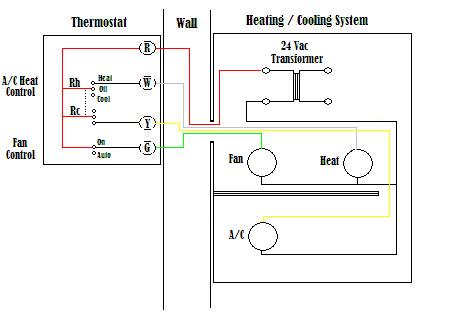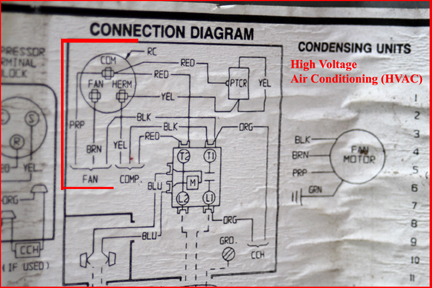Sunday, March 31, 2013
Vatterott College Adds Hvac Training Programs Joplinworldnews

Basic Thermostat Wiring Diagram.

How To Read Hvac Wiring Diagrams Ehow Com.

Circuit Diagram.

Wiring Diagram Automotive Wiring Diagrams And Electrical Diagrams.

Hydronics Wikipedia The Free Encyclopedia.

Heat Pump And Refrigeration Cycle Wikipedia The Free Encyclopedia.

Thermostat Wiring Diagram.

How To Read Automobile Wiring Diagrams Ehow Com.

Vatterott College Adds Hvac Training Programs In Joplin Worldnews.

On My Diagram Below The Run Capacitor Is On The Left And Marked Rc.
Saturday, March 30, 2013
Converting a Dead CFL into an LED Tubelight Circuit Idea
You might have already read about this interesting idea in many different sites. Its about converting a dead CFL into a sleek LED tube light circuit. In this post we learn the procedures with more details.
How many times did you throw away a dead or over used faulty CFL unit into the dust bin? Well, we do this quite often whenever we find one of our home CFL lamps no longer illuminating or illuminating dimly.
You would be surprised to know that the circuit inside the lamp in fact never blows of or becomes weak. Its the tube portion which gets blackened, and unresponsive. It means the circuit of most of the discarded CFL units never goes faulty, and can be recycled through some other means.
For a layman this might look pretty tough....but actually its quite easy. The tube portion of the CFL may be simply replaced with LEDs, and reused for getting the same illumination that your previous CFL used to give... well almost the same.
Lets learn the procedures.
Find a dead CFL unit, and very carefully open up the lid which holds the tube from the lower cup type enclosure.
You must do this very carefully using a screwdriver equipment, making sure you dont damage the internal circuit while doing this.
If you find it difficult to insert the screwdriver end across the joint opening, use a fine hacksaw to make a small section of the opening wider by sawing it some. Now you can force open the lid by using the screwdriver.
This will immediately expose the internal circuit and the connections.
You will find the tube ends terminating with a pair of wires and connecting with the circuit board at four points arranged in a row through fine wire links. Cut these connections with a sniper so that the tube portion gets separated from the circuit board.
Join the above terminals from the ends so that only two terminals end up as the output.
Next using 4 nos 1N4007 diodes build a bridge rectifier, and connect it to the above terminals as shown in the diagram.
Now through a suitable holder and plug device connect the above system to mains and check the voltage a the output of the above connected rectifier.
It should be around 100 to 150 volts DC.
You have just transformed a dead CFL into a small transformerless power supply ideally suitable for illuminating LEDs (white).
Now comes the LED assembly part which may be constructed in the following manner:
To figure out the number of LEDs that would fit inside the output voltage of the above unit, we need to divide the measured voltage with 3.3V. Suppose the measured voltage was 120V, dividing this by 3.3 would give around 36 (numbers).
Use the derived number of LEDs and connect all of them in series with a 5 Ohm, 1/4 watt series resistor.
Done! Now simply connect the LED assembly end terminals with the bridge output of the modified CFL power supply.
You can test the system by providing mains supply to it....the LEDs should illuminate with dazzling light.
Now fix the assembly appropriately so that the CFL circuit gets inside its original holder while the LEDs may be integrated to the holder over a suitable rectangle type of box, or inside any other decorative cabinet as per user preference.
WARNING: THE IDEA IS BASED ON A SIMILAR CIRCUIT WHICH WAS PUBLISHED IN A DIFFERENT WEBSITE, IT HAS NOT BEEN VERIFIED BY THE AUTHOR.
THE CIRCUIT IS NOT ISOLATED FROM MAINS, AND THEREFORE IS EXTREMELY DANGEROUS IN UNCOVERED, POWERED POSITION.



How many times did you throw away a dead or over used faulty CFL unit into the dust bin? Well, we do this quite often whenever we find one of our home CFL lamps no longer illuminating or illuminating dimly.
You would be surprised to know that the circuit inside the lamp in fact never blows of or becomes weak. Its the tube portion which gets blackened, and unresponsive. It means the circuit of most of the discarded CFL units never goes faulty, and can be recycled through some other means.
For a layman this might look pretty tough....but actually its quite easy. The tube portion of the CFL may be simply replaced with LEDs, and reused for getting the same illumination that your previous CFL used to give... well almost the same.
Lets learn the procedures.
Find a dead CFL unit, and very carefully open up the lid which holds the tube from the lower cup type enclosure.
You must do this very carefully using a screwdriver equipment, making sure you dont damage the internal circuit while doing this.
If you find it difficult to insert the screwdriver end across the joint opening, use a fine hacksaw to make a small section of the opening wider by sawing it some. Now you can force open the lid by using the screwdriver.
This will immediately expose the internal circuit and the connections.
You will find the tube ends terminating with a pair of wires and connecting with the circuit board at four points arranged in a row through fine wire links. Cut these connections with a sniper so that the tube portion gets separated from the circuit board.
Join the above terminals from the ends so that only two terminals end up as the output.
Next using 4 nos 1N4007 diodes build a bridge rectifier, and connect it to the above terminals as shown in the diagram.
Now through a suitable holder and plug device connect the above system to mains and check the voltage a the output of the above connected rectifier.
It should be around 100 to 150 volts DC.
You have just transformed a dead CFL into a small transformerless power supply ideally suitable for illuminating LEDs (white).
Now comes the LED assembly part which may be constructed in the following manner:
To figure out the number of LEDs that would fit inside the output voltage of the above unit, we need to divide the measured voltage with 3.3V. Suppose the measured voltage was 120V, dividing this by 3.3 would give around 36 (numbers).
Use the derived number of LEDs and connect all of them in series with a 5 Ohm, 1/4 watt series resistor.
Done! Now simply connect the LED assembly end terminals with the bridge output of the modified CFL power supply.
You can test the system by providing mains supply to it....the LEDs should illuminate with dazzling light.
Now fix the assembly appropriately so that the CFL circuit gets inside its original holder while the LEDs may be integrated to the holder over a suitable rectangle type of box, or inside any other decorative cabinet as per user preference.
WARNING: THE IDEA IS BASED ON A SIMILAR CIRCUIT WHICH WAS PUBLISHED IN A DIFFERENT WEBSITE, IT HAS NOT BEEN VERIFIED BY THE AUTHOR.
THE CIRCUIT IS NOT ISOLATED FROM MAINS, AND THEREFORE IS EXTREMELY DANGEROUS IN UNCOVERED, POWERED POSITION.



Fuse Box Chevrolet Aveo Engine Compartment 2009 Diagram
Fuse Box Chevrolet Aveo Engine Compartment 2009 Diagram - Here are new post for Fuse Box Chevrolet Aveo Engine Compartment 2009 Diagram.
Fuse Panel Layout Diagram Parts: Cooling fan HI relay, Instrument Panel Fuse Box, Starter Relay, Power Window Switch, Cooling fan LOW relay, A/C Compressor Relay, Tail Lamp (LH), Side Marker (LH), Turn Signal & Parking Lamp (LH), License Lamp, Front Fog Lamp Relay, Fuel Pump Relay, Hazard Switch, Hood Contact Switch, Head Lamp(LH), IP Fuse Block, Ignition Switch, Evap Canister Purge Solenoid, Thermostat Heater, HO2S, MAF Sensor.
More...
Fuse Box Chevrolet Aveo Engine Compartment 2009 Diagram
Fuse Panel Layout Diagram Parts: Cooling fan HI relay, Instrument Panel Fuse Box, Starter Relay, Power Window Switch, Cooling fan LOW relay, A/C Compressor Relay, Tail Lamp (LH), Side Marker (LH), Turn Signal & Parking Lamp (LH), License Lamp, Front Fog Lamp Relay, Fuel Pump Relay, Hazard Switch, Hood Contact Switch, Head Lamp(LH), IP Fuse Block, Ignition Switch, Evap Canister Purge Solenoid, Thermostat Heater, HO2S, MAF Sensor.
Subscribe to:
Comments (Atom)

